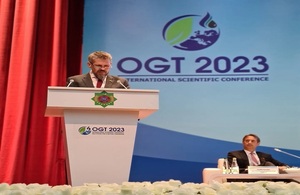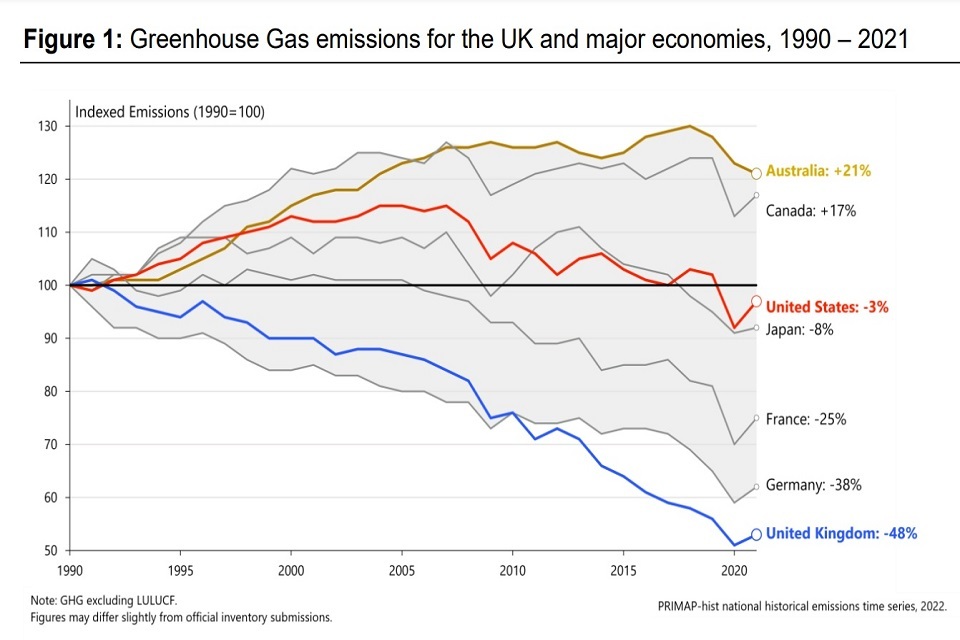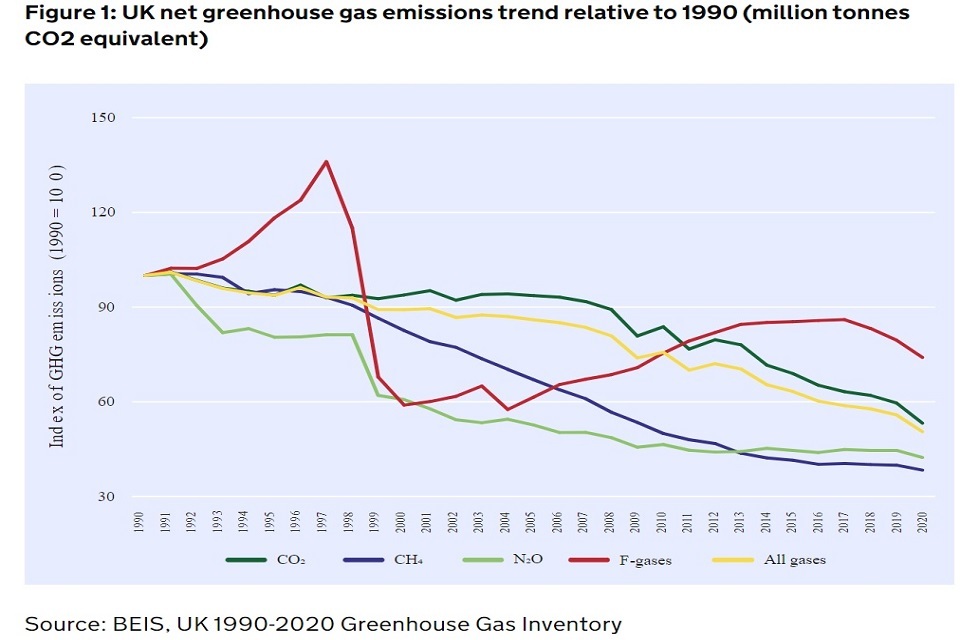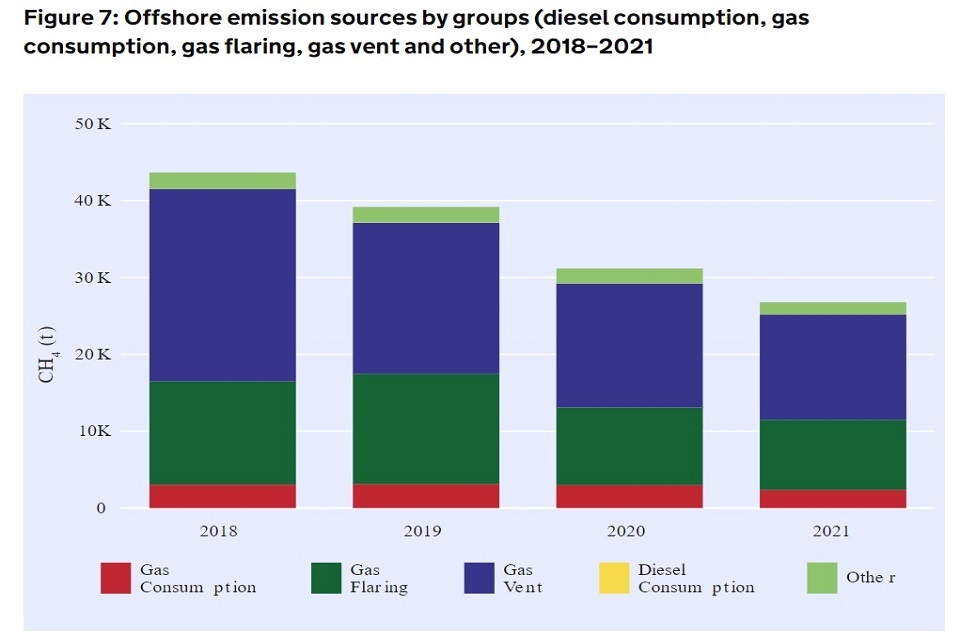Chargé d’Affaires at the British Embassy Ashgabat speaks on climate change
Chargé d’Affaires at the British Embassy in Ashgabat, John Hamilton, spoke at the international scientific conference in Ashgabat on 15 June 2023

Chargé d’Affaires Mr John Hamilton discussed Environmental Issues of the Development of Hydrocarbon Fields at the International Conference in Ashgabat.
UK Chargé d’Affaires, John Hamilton spoke at the “International scientific conference on energy perspectives, new technologies and environmental aspects in the development of hydrocarbon resources”:
It’s an honour to speak in such auspicious company.
Often when making speeches on climate issues I find myself quoting from reports produced by many of the people here today.
I will try to not go too scientific as there are many more experts in the room and online who can talk in more detail than I can manage.
I would like to talk about what my country is doing domestically, internationally and here in Turkmenistan on the issue of climate change and emission reduction.
Unlike some other global matters, issues related to climate change and energy do not feel at all distant for us here in Turkmenistan.
The UK has made huge progress in decarbonising its economy and decoupling greenhouse gas emissions from economic growth.
Thanks to our Climate Change Act (2008) and Environment Act (2021), we have a strong legal framework for reaching net zero emissions by 2050.
The UK was the first G7 country to sign into law commitments to net zero greenhouse gas emissions by 2050.

Greenhouse Gas emissions for the UK and major economies
Between 1990 and 2021, we cut our emissions by 48%, decarbonising faster than any other G7 country, whilst growing our economy by 65%.
Compared to 1990 levels by 2020 methane emissions from the UK energy sector reduced by 84% in.

UK net greenhouse gas emissions
Between 1990 and 2020, UK’s overall methane emissions dropped by 62%, more than any other OECD country.
To achieve this we introduced measures such as:
- an upgrade of the gas network from iron pipes to plastic pipes;
- proactive abatement initiatives such as facilities installing flare gas recovery systems, increasing equipment efficiency and using leakage detection systems;
- better flare and venting management practices.
The UK’s North Sea Transition Area Strategy that came into force in February 2021 incorporates a range of net zero obligations for the UK oil and gas industry. The strategy includes commitments that will lead to zero routine flaring and venting for all by 2030.

Offshore emission sources by groups
Gas and oil production has increased, even as emissions have fallen.
We completely recognise that each country’s circumstances are different, including their pathway to net zero and contribution to meeting the goals of the Paris Agreement.
Developing countries need sufficient energy supply to support economic growth.
Many have little responsibility for global warming to date, but are bearing the brunt of its effects.
The UK is committed to doubling its International Climate Finance to £11.6 billion between 2021-2025, supporting energy efficiency and renewable energy deployment in developing countries
Since 2011 UK International Climate Finance has:
- helped over 95 million people cope with the effects of climate change;
- provided 58 million people with improved access to clean energy;
- reduced or avoided 68m tonnes of greenhouse gas emissions;
- and leveraged £5.2bn of private finance.
UK is currently the largest contributor to Green Climate Fund, £1.44bn for 2020-23, helping reduce emissions and build climate resilience in over 125 developing countries, including Turkmenistan.
We continue to be a major contributor to the Global Environment Facility (GEF), which works across the environment, conservation and climate agendas, including in Turkmenistan.
Our COP Presidency showed UK leadership and credibility.
At COP26 in Glasgow all 197 Parties agreed the Glasgow Climate Pact, reaching consensus on the need for urgent climate action.
The Global Methane Pledge launched in Glasgow now has 150 participants agreeing to take voluntary action to global methane emissions by at least 30 percent, from 2020 levels, by 2030.
We were pleased that Turkmenistan participated at its highest ever level at CoP26.
We welcome recent signs from Turkmenistan of plans to take action to tackle methane pollution. The Roadmap announced on 10 June was an important step we hope to see prompt implementation of the planned methane study. We stand ready to support.
As an Embassy we are already supporting much needed work with UNDP and the government to update Turkmenistan’s Greenhouse Gas Inventory. This will result in a better understanding of the scale of emissions and guide efforts to address them.
Turkmenistan has an incredible opportunity to be a climate leader internationally, which will create a positive image for the country and help attract new partners and investment.
Work on climate change issues are at the heart of what we do as an embassy. We support projects where we can. We advocate enthusiastically.
We have recast our focus at the Turkmenistan UK Trade and Industry Council towards promoting sustainable business opportunities. We look forward to receiving UK companies here later in the year who are ready to work here bringing with them expertise and experience.
Companies like Aggreko, who are a world-leading provider of modular solutions for monetising methane emissions, also known as associated petroleum gas (APG).
APG is usually flared leading to greenhouse gas emissions. Aggreko supplies portable equipment available to rent to monetise APG, through power generation, temperature control and energy services. The company operates in 80 countries and is happy to offer their services to Turkmen partners.
UK Export Finance have up to £1.75 billion/$2.1 billion available, on very favourable terms to support investments in Turkmenistan. UKEF support is already financing clean energy projects around the world and are willing to work here.
A recent study has shown that investments in renewable energy have seen a 367% greater return than fossil fuels since 2010. International Renewable Energy Agency estimates that solar PV alone already creates twice as many jobs as fossil fuels.
The UK has launched the Energy Transition Council (ETC), with over 20 governments and over 15 international institutions participating, to support countries’ transitions to clean power. The ETC brings together the political, financial and technical leaders of the global power sector to accelerate the transition to clean power. The Council provides fast-acting technical assistance to developing countries through its Rapid Response Facility supported by a range of donor governments, MDBs and philanthropic organisations.
You will hear today that action on methane is recognised as the ‘last low hanging fruit’ in tackling climate change. Measure to tackle methane are readily available and in many cases very cost effective.
This is true.
But I would like to end with an important reminder that should not get lost in talk of global targets, monetisation and production efficiencies.
According to the Global Methane Assessment from the Climate and Clean Air Coalition and UNEP, achieving the 2030 methane reduction goal can:
- prevent over 200,000 premature deaths,
- hundreds of thousands of asthma-related emergency room visits,
- and prevent over 20 million tons of crop losses a year by 2030 through reducing ground-level ozone pollution caused in part by methane.
I hope that we will all find ways through events like these to bring about the changes needed that will have an impact on each of us.